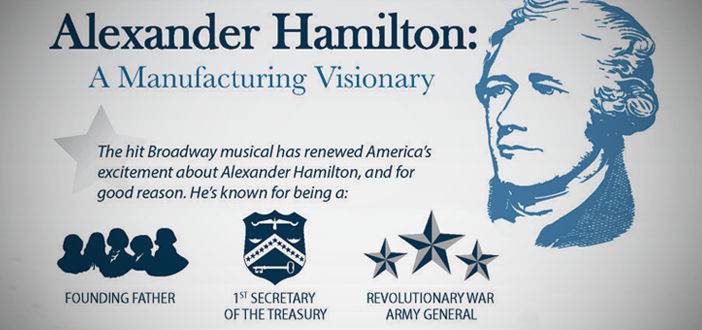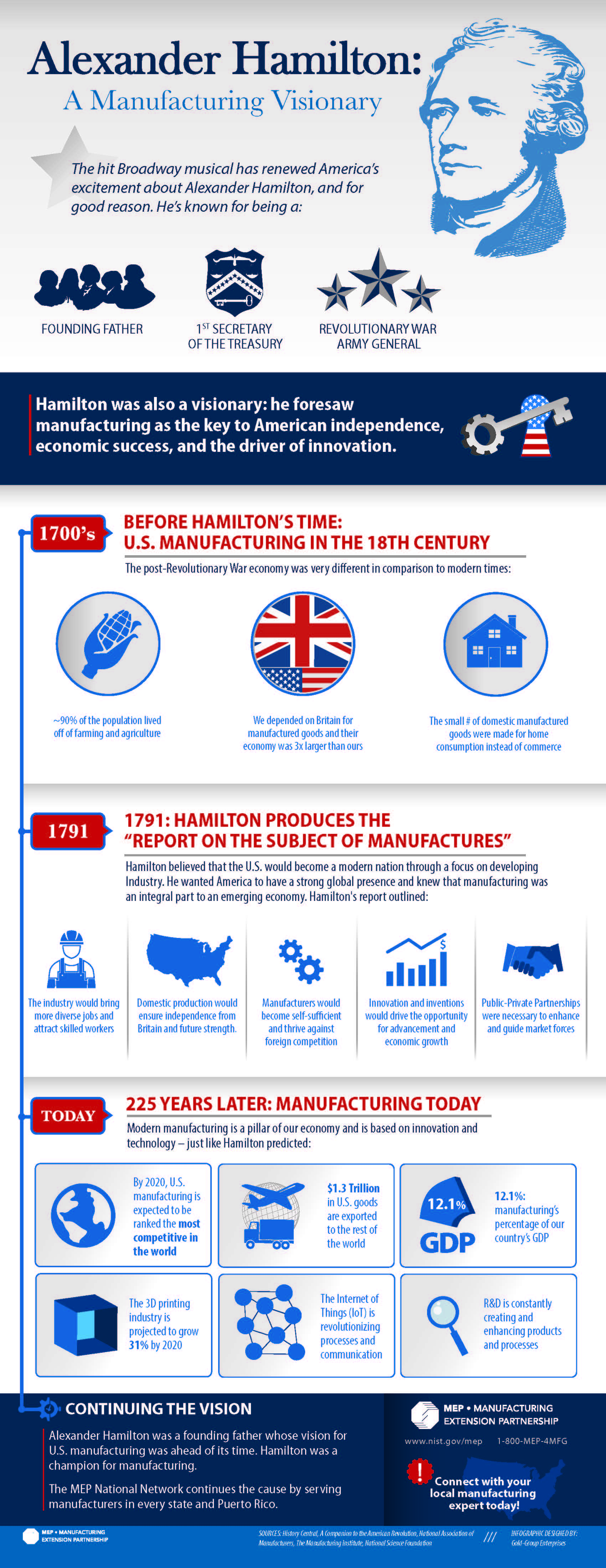5, December 2016
Manufacturing Yesterday, Today and Tomorrow

By Carroll Thomas on · U.S. Manufacturing
Today is the 225th anniversary of Alexander Hamilton’s report on manufacturing to Congress. Wow! 225 years?! Ok, I realize that only us true manufacturing wonks will get all jazzed up about this epic historic event, but I believe that everyone in this country should celebrate this day the same as we do the 4th of July. Why should we? Well, I’ll tell you why.
On Monday, December 5, 1791, the Secretary of the United States Treasury, Alexander Hamilton, submitted his Report on Manufactures: Communication to the House of Representatives. Hamilton’s report, commissioned by Congress, passionately and thoroughly laid out how the United States could gain specific economic advantages by encouraging the growth of manufacturing in the newly formed United States of America. Hamilton asserted that manufacturing would bring the added diversity of employment opportunities with increased productivity from using machinery and employment of technical skills. He saw manufacturing as a way of helping the country become “independent of foreign nations for military and other essential supplies.” Hamilton specifically called out the need for government to nurture a fledgling manufacturing sector. He compellingly outlined how manufacturing alongside a strong agrarian economy would make the United States of America the greatest economy in the world! When you think that he was able to clearly see this 225 years ago, it is nothing short of astounding.
Fast forward to today, where last year alone the manufacturing sector contributed $2.2 trillion (about 12%) to the $18 trillion-dollar U.S. economy.i Manufactured goods accounted for 89% of all U.S. exportsii and has grown at a faster rate than the rest of the economy since the 2008-2009 recession. For every $1 manufacturing contributes to the economy, it supports an additional $1.81 in economic activity, greater than any other sector.iii The average annual wage of manufacturing workers is $65,000, 21% higher than the overall average.iv This is more than twice the average for larger-employing sectors, such as retail, accommodations, and food services.v All of this proof of Hamilton’s vision of manufacturing and its importance to the U.S. economy.
Even with the fantastic news about how manufacturing greatly impacts our economy today, the industry still needs the attention of policymakers.
Hamilton’s Report on Manufactures insisted that America’s ascendency required the government to purposely encourage the growth of manufacturing. He mentioned that other nations were engaged with their manufactures to spur industrialization in order to offset risks to their agrarian-based economies. This part of Hamilton’s report was pretty much ignored. However, it turned out that circumstances such as the need to build infrastructure for the newly formed United States and ensuing world wars became the impetus for government to play a role in developing a strong manufacturing base.
And then over a twelve-year period starting in 1998 the manufacturing sector lost 6 million jobs. The subsequent recovery brought jobs, but the best of these jobs were in advanced manufacturing. We now face a situation where tens of thousands of manufacturing jobs are going unfilled because skills needed now don’t match the skills of the displaced workforce from the great recession.
With the advent of the next phase in manufacturing—Manufacturing 4.0, government encouragement through programs such as the Hollings Manufacturing Extension Partnership (MEP) can help and is needed to connect people of all ages who wish to enter or rejoin a new and exciting manufacturing workforce. The continued recovery and advancement into the future of manufacturing means understanding fundamental challenges that the sector faces and meeting those head-on.
The MEP national network, a public/private partnership in all 50 states and Puerto Rico, is represented in Illinois by the Illinois Manufacturing Excellence Center (IMEC). The Chicago Community Trust (Chicagoland Workforce Funders Alliance), a group of foundations, are working together to address workforce challenges in Illinois. Combined with two national foundations (Kellogg and Hitachi Foundations), they have invested around $1.3 million into IMEC for an initiative called Genesis.
The premise of Genesis is simple—help manufacturing companies be stronger and simultaneously create opportunities for the workforce. The model is to focus on the three primary drivers for any business—the People, Processes, and Products. They are currently piloting an approach that involves a two-year commitment from companies. They work on 90-day cycles to drive progress in each of the three areas. While the premise is simple, the work has been very challenging (time commitment over the long haul, translation of company successes into workforce benefits). This is just the type of government investment in strategic work and workforce impact that our MEP Centers strive for every day.
I am as grateful to Alexander Hamilton for his report as I am proud to lead the incredible MEP system. We have over 1,200 trusted manufacturing business advisors supported by public and private funding who are solely focused on building and growing America’s manufacturing businesses.
I really wish that Mr. Hamilton were here today to see how far we’ve come and experience all of the excitement of where we will be going in manufacturing in the years to come!

i U.S. Bureau of Economic Analysis, 2015.
ii U.S. International Trade Administration, Trade Stats Express.
iii National Association of Manufacturers
iv U.S. Bureau of Labor Statistics, Quarterly Census of Earnings and Wages, Q1 2016 data (http://www.bls.gov/news.release/pdf/cewqtr.pdf)
v http://newsroom.huntingtoningalls.com/speeches/u-s-manufacturing-and-public-policy-conference-keynote
About Author
Carroll Thomas is the Director of the NIST Manufacturing Extension Partnership. In her role as Director, she is responsible for a nationwide network of centers to help U.S. manufacturers compete globally, supporting greater supply chain integration and providing access to technology.